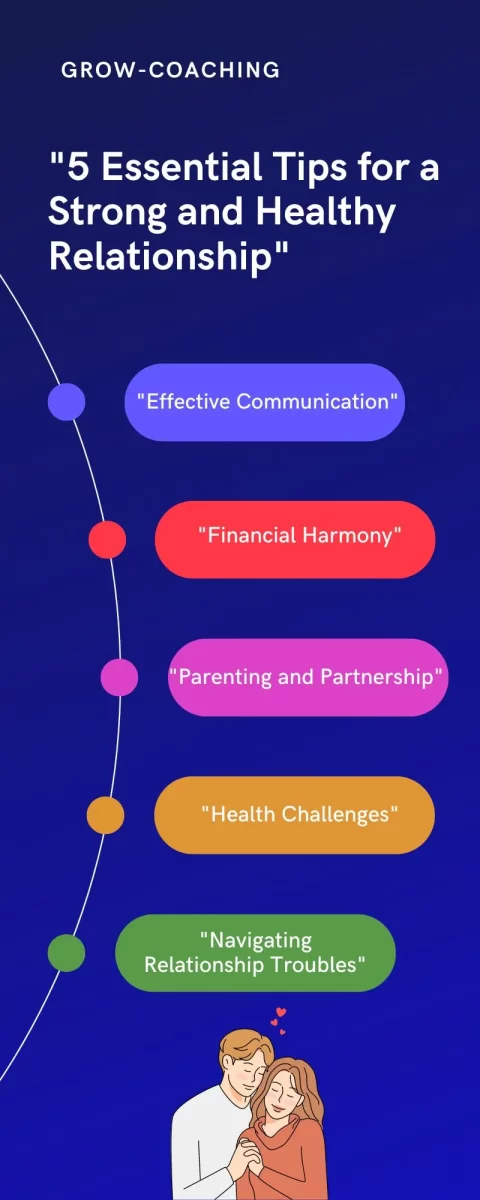Looking for relationship advice is a smart move for anyone in a relationship. It helps you and your partner understand each other better and stay close. No matter if you’re just starting out or have been together for a long time, every relationship has its ups and downs.
This article talks about different parts of being in a relationship. We look at the early days when everything is new, and also at tougher times, like when money is tight or when you become parents. We give you tips and ideas to help you and your partner get through these times together.
Our main goal is to give you the advice you need for a strong, happy relationship. We want to help you and your partner connect more and support each other through good times and bad.
Stage 1
Building a Strong Foundation in Early Stages (relationship advice)
In the early stages of any relationship, laying a strong foundation is crucial for long-term success.
This period is not just about the excitement and romance; it’s also about building a deep understanding and effective communication between partners.
- Communication: The Heart of Understanding:
Clear and open communication is essential from the start. It’s important to express your thoughts, feelings, and expectations honestly. Good communication helps in resolving conflicts, understanding each other’s perspectives, and building trust. Remember, it’s not just about talking; it’s equally important to be a good listener.
- Balancing Individuality and Togetherness:
While it’s wonderful to share interests and experiences, maintaining individuality is key. Encourage each other to pursue personal hobbies and spend time with friends. This balance between individuality and partnership enriches the relationship, allowing each person to bring more to the table.
- Setting Goals and Expectations:
Early on, discuss your aspirations, both personal and as a couple. Do you share similar values and life goals? Are your career aspirations compatible? Setting clear expectations and goals helps in aligning your paths and understanding what each of you envisions for the future.
- Respecting Differences:
Every individual is unique, and so are their views and ways of handling situations. Respecting each other’s differences and finding a middle ground is crucial. It’s not about changing the other person but about appreciating their uniqueness.
- Building Trust:
Trust is the foundation of any strong relationship. Be reliable, keep your promises, and be there for each other. Trust builds over time through consistent actions and sincerity in words.

Stage 2
Fostering Deeper Bonds in the Early Stages of a Relationship
As couples embark on the journey of building a life together, the need for sound relationship advice becomes increasingly evident. The early stages, often filled with excitement and discovery, also lay the groundwork for deeper, lasting connections.
- Prioritizing Open Communication:
Clear and consistent communication is the cornerstone of any thriving relationship. It’s crucial to establish a habit of openly sharing feelings, desires, and concerns. This level of transparency not only strengthens trust but also deepens mutual understanding.
- Maintaining Individuality Within the Partnership:
In a healthy relationship, respecting and supporting each partner’s individuality is key. Encouraging personal growth and interests outside the relationship is not just beneficial; it’s essential. This approach fosters a dynamic where both partners can grow individually and together.
- Aligning Goals and Visions:
Early in the relationship, it’s beneficial to discuss and align your goals and future plans. Whether it’s career ambitions, lifestyle choices, or family plans, having a shared vision fortifies the relationship and ensures that both partners are moving in the same direction.
- Embracing Differences with Respect:
Differences in opinion and approach are natural in any partnership. Embracing these differences with respect and understanding is vital. It’s about finding common ground and learning from each other’s perspectives, which enriches the relationship.
- Building a Foundation of Trust:
Trust is the bedrock of any strong relationship. It is built over time through consistent actions, reliability, and honesty. A relationship grounded in trust paves the way for a secure and supportive partnership.
In conclusion, the early stages of a relationship offer a unique opportunity to build a strong foundation.
By focusing on open communication, respecting individuality, aligning goals, embracing differences, and fostering trust, couples can create a resilient and lasting bond. These initial efforts lay the groundwork for a relationship that can thrive through life’s various challenges and phases.
Stage 3
Navigating Financial Challenges Together
Financial stress can test even the strongest of relationships, making it crucial to seek relationship advice tailored to handling money matters as a couple. Openly addressing financial challenges is key to maintaining harmony and trust.
- Open Dialogue on Finances:
Transparency in financial discussions lays the foundation for trust and mutual understanding. Regularly discussing budgets, expenses, and financial goals helps couples align their fiscal strategies and avoid misunderstandings.
- Joint Financial Planning:
Creating a joint financial plan can strengthen a couple’s partnership. It involves setting shared financial goals, budgeting together, and making decisions about savings and investments. This collaborative approach not only eases financial strain but also fosters a sense of teamwork.
- Respecting Individual Financial Perspectives:
Each partner may have different views on spending and saving. It’s essential to respect these differences and find a middle ground that works for both. This balance is key to a healthy financial relationship.
- Handling Debt and Financial Uncertainty:
If one or both partners are dealing with debt or financial uncertainty, it’s important to address these issues head-on. Working together to create a plan to manage debt can reduce stress and build financial resilience.
- Seeking Professional Advice:
In complex financial situations, seeking advice from a financial advisor can be beneficial. Professional guidance can provide clarity, help in making informed decisions, and set a path for financial stability.
By addressing financial challenges openly and working together on solutions, couples can overcome one of the most common stressors in relationships. Financial harmony is an important aspect of a strong, enduring partnership and is a critical component of holistic relationship advice.
Stage 4
Strengthening Relationships After Becoming Parents
Becoming parents is a significant milestone that brings about profound changes in a relationship. During this phase, effective relationship advice is crucial for maintaining a strong and healthy partnership amidst new responsibilities.
- Adjusting to New Roles:
Transitioning to parenthood requires adaptability and patience. It’s important to support each other as you navigate these new roles. Open communication about each partner’s feelings and challenges can help in adjusting smoothly.
- Balancing Parenting and Partnership:
While parenting is a shared responsibility, it’s vital to keep the romantic relationship alive. Setting aside time for each other, like regular date nights or shared activities, helps maintain a strong emotional connection.
- Sharing Parenting Duties Equally:
Distributing childcare and household responsibilities fairly can prevent resentment and strengthen the bond. Discussing and agreeing on how to share these tasks promotes teamwork and mutual respect.
- Managing Sleep Deprivation and Stress:
The early stages of parenting often involve sleepless nights and increased stress. Being understanding and patient with each other during these times is key. Small acts of kindness can go a long way in showing care and support.
- Keeping Communication Open:
Regular check-ins about each other’s well-being are crucial. This practice ensures that both partners feel heard and valued, fostering a supportive and loving environment.
- Seeking External Support:
Sometimes, seeking external support like counseling can be beneficial. Professional guidance can help in navigating the complex emotions and challenges that come with parenthood.
Navigating the journey of parenthood together strengthens the foundation of a relationship. By focusing on open communication, balancing duties, and prioritizing the couple’s relationship alongside parenting, couples can maintain a strong and loving partnership. This period, while challenging, also offers an opportunity to grow closer and deepen the bond.
Stage 5
Supporting Each Other Through Health Challenges
When a couple faces health challenges, the need for solid relationship advice becomes more evident. Navigating health issues together can be a test of the relationship’s strength and resilience.
- Open Communication About Health Issues:
Honest and open communication about health concerns is vital. Discussing fears, expectations, and needs helps both partners understand and support each other effectively.
- Practicing Empathy and Patience:
Health challenges can be physically and emotionally draining. Showing empathy and patience towards each other’s experiences strengthens the bond and provides much-needed emotional support.
- Sharing Caregiving Responsibilities:
If one partner is unwell, sharing caregiving duties can alleviate stress. It’s important to work together to manage these responsibilities while ensuring the caregiver also gets time to rest and recharge.
- Adjusting Lifestyle and Routines:
Health issues may require changes in lifestyle and routines. Being flexible and willing to adapt to these changes demonstrates commitment and support for each other’s well-being.
- Seeking External Support and Resources:
Sometimes, external support, such as counseling or support groups, can be beneficial. These resources provide additional guidance and coping strategies for dealing with health challenges.
- Maintaining Intimacy and Connection:
Maintaining emotional and physical intimacy is important, even when health issues arise. Finding new ways to connect and show affection can keep the relationship strong.
Health challenges can be a difficult phase for any couple. However, by maintaining open communication, practicing empathy, sharing responsibilities, and seeking support, couples can navigate these challenges together. These experiences can bring partners closer, fostering a deeper understanding and strengthening the bond.
Stage 6
Overcoming Common Relationship Troubles
Every relationship encounters its share of troubles, and understanding how to navigate these is a crucial aspect of relationship advice. Addressing issues effectively can strengthen the bond between partners.
- Identifying and Addressing Communication Barriers:
Effective communication is often the first line of defense against relationship troubles. Identifying and working through barriers to open communication can prevent misunderstandings and foster a healthier relationship dynamic.
- Rekindling Romance and Connection:
In long-term relationships, keeping the romance alive is essential. Planning regular date nights, expressing affection, and spending quality time together can reignite the spark that may have dimmed over time.
- Dealing with Trust Issues:
Trust is fundamental in any relationship. If trust issues arise, it’s important to address them head-on. Honesty, transparency, and consistent behavior are key to rebuilding trust.
- Managing External Stressors:
External factors like work stress or family issues can strain a relationship. Finding ways to support each other through these stressors can strengthen your bond.
- Balancing Individual Needs with Relationship Goals:
It’s important to balance personal needs and aspirations with those of the relationship. This balance ensures that both partners feel fulfilled and valued.
- Seeking Professional Help When Needed:
Sometimes, the best course of action is to seek professional help. Relationship counseling can provide valuable insights and tools for overcoming challenges and improving the relationship.
By facing relationship troubles together and utilizing effective strategies, couples can overcome challenges and build a stronger, more resilient partnership. Remember, overcoming difficulties can be an opportunity for growth, bringing partners closer and deepening their understanding of each other.
Conclusion
The key to a lasting relationship is ongoing effort and clear communication. As we’ve explored different stages and challenges, remember that each relationship is unique. Adapting this advice to fit your own situation is crucial.
Every relationship has the potential for growth and resilience. Challenges can strengthen bonds, and understanding each other’s needs fosters a deeper connection.
In closing, let this guide be a starting point. Use these insights to nurture your relationship, knowing that with patience and effort, it can thrive through any challenge. Your journey together is a testament to the power of love and partnership.














